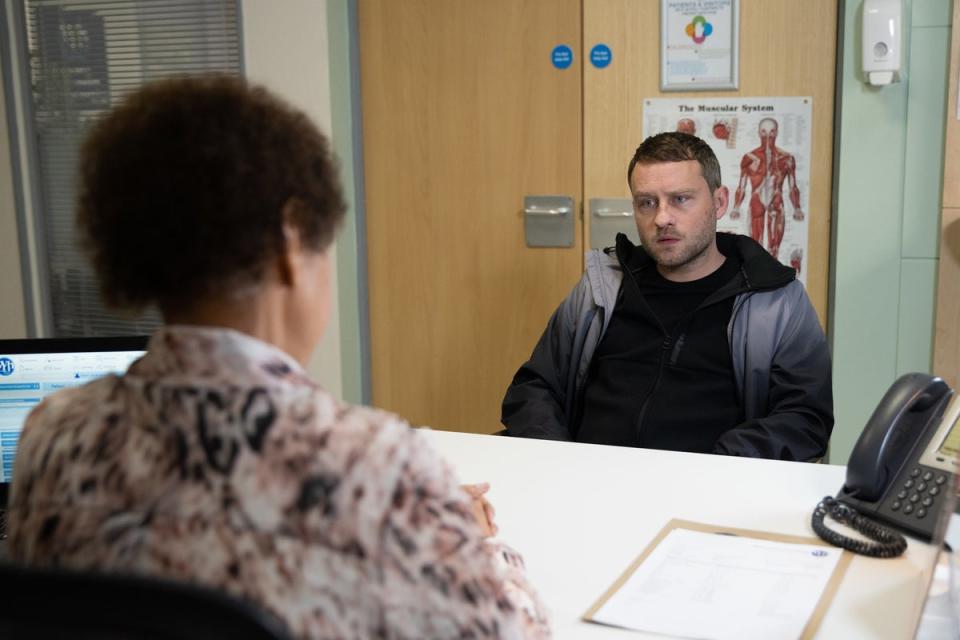As Coronation Street’s Paul Foreman is diagnosed with motor neurone disease: What is MND?

Coronation Street’s Paul Foreman, played by Peter Ash, is set to be diagnosed with motor neurone disease (MND).
In a first for the long-running ITV soap, Friday’s episode (March 24) will see the builder referred to a specialist following weeks of speculation about what is causing his clumsiness, before being given a diagnosis of MND in April.
“Motor Neurone Disease (MND) is a rare condition, affecting around 5,000 people in the UK,” explains Dr Pablo Garcia Reitboeck, consultant neurologist at London Bridge Hospital, part of HCA Healthcare UK.
“Unfortunately, there is no cure for MND, but a lot can be done to improve a person’s quality of life and to manage symptoms.”
Here, doctors talk through the symptoms, treatments and prognosis for MND.
What is motor neurone disease?
“This is the name that encompasses a group of conditions that characteristically affect the motor cells in the nervous system,” says Dr Khalid Ibrahim, senior attending physician at Sidra Medicine.
Garcia Reitboeck explains: “MND occurs when specialist nerve cells in the brain and spinal cord, called motor neurones, stop working and die prematurely. This is called neurodegeneration.”
This includes diseases such as amyotrophic lateral sclerosis (ALS), progressive bulbar palsy, progressive muscular atrophy, and Kennedy’s disease.
Researchers are still unclear on the exact causes, Garcia Reitboeck continues: “Most people have sporadic MND, which is likely caused by a combination of multiple genetic and environmental factors. A minority of patients – less than 10% – have a single gene defect which causes MND which can be passed on through generations.”
What are some of the signs or symptoms of MND?
Symptoms of motor neurone disease happen gradually over time and may not be obvious at first.
Garcia Reitboeck says: “Early symptoms can include weakness in your legs – this can cause you to trip or struggle to climb stairs; slurred speech and swallowing problems; muscle cramps and twitches, and progressive weight loss.”
Arm weakness can impair movement: “You might start to notice you’re dropping things or finding it hard to do daily tasks, such as doing up your buttons.”
Breathing problems can cause shortness of breath on exertion or when lying down.
“Sometimes MND can cause cognitive problems and personality change,” Garcia Reitboeck adds. “MND can change your ability to control your emotions, so you may have difficulty stopping yourself from crying or laughing in inappropriate situations.”
What is the typical prognosis for MND?
While there’s no cure for MND, the progression of the condition varies between patients.
“The manner in which the disorders present depends on which set of motor cells are affected, the upper motor neurons or the lower motor neurons,” Ibrahim says.
“The progression of the weakness and the effect on other body functions can lead to severe disability and can result in early death in some affected children.”
For adults, around 75% of those diagnosed with MND will die within two to three years of initial diagnosis. “But 10% can survive more than 10 years after being diagnosed,” Garcia Reitboeck says.
Stephen Hawking, for example, was diagnosed in his early 20s and lived with the condition until his death in 2018, aged 76.
“If you are worried that you or a loved one is starting to show symptoms of MND, it is important to visit or take them to your doctor as soon as possible,” Garcia Reitboeck adds.
“Early diagnosis means that treatment can begin earlier to reduce the symptoms, and make you or your loved one more comfortable.”
What treatments are available?
Because there isn’t currently a cure, MND treatment focuses on managing the symptoms.
“Home care is an important part of supportive management for MNDs, alongside frequent inpatient care,” says Ibrahim. “The management and care are delivered by a multidisciplinary team of physicians, nurses, therapists, dieticians and social workers.”
Patients may be offered non-invasive ventilation, particularly at night, to help with respiratory muscle weakness.
“Multi-disciplinary care can improve quality of life and survival as symptoms are pro-actively managed,” Garcia Reitboeck says. This may include “occupational therapy, physiotherapy, speech and language therapy, dietician, palliative care, input from respiratory physician and neurologist.”
Prevention of weight loss is important and patients may be offered a feeding tube at later stages.
“Very few of the disorders in the MND group are amenable to specific therapies,” says Ibrahim, although gene replacement therapy can be prescribed in some cases.
“Some of the inflammatory conditions in the MND group can be helped by some of the immune modulators, like steroids or intravenous immunoglobulin.”
Pain relief and medications to relieve muscle stiffness may be required, while Riluzole is currently the only drug licensed for MND treatment in the UK.
Garcia Reitboeck explains: “Riluzole is thought to slow down the damage to the motor neurone cells by reducing their sensitivity to the nerve transmitter glutamate. It has been found have a modest effect on survival in a clinical trial.”

